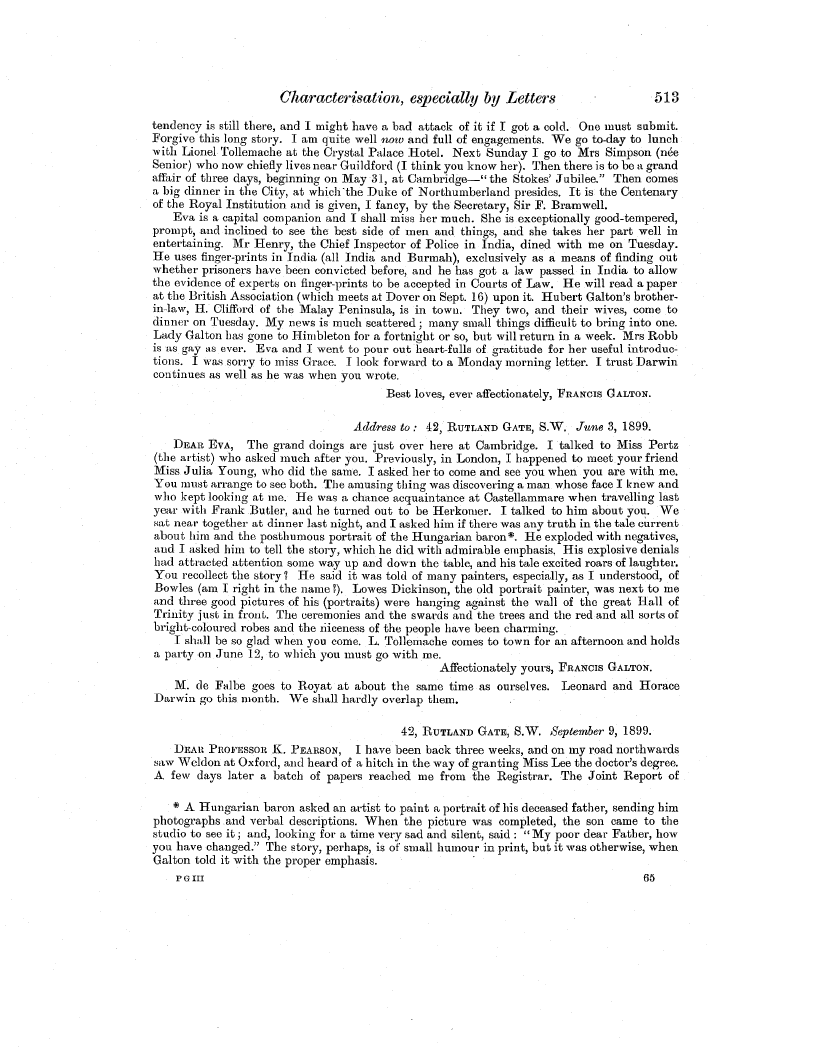| ||||||

OCR Rendition - approximate
Characterisation, especially by Letters 513 tendency is still there, and I might have a bad attack of it if I got a cold. One must submit. Forgive this long story. I am quite well now and full of engagements. We go to-day to lunch with Lionel Tollemache at the Crystal Palace Hotel. Next Sunday I go to Mrs Simpson (nee Senior) who now chiefly lives near Guildford (I think you know her). Then there is to be a grand affair of three days, beginning on May 31, at Cambridge-" the Stokes' Jubilee." Then comes a big dinner in the City, at which'the Duke of Northumberland presides. It is the Centenary of the Royal Institution and is given, I fancy, by the Secretary, Sir F. Bramwell. Eva is a capital companion and I shall miss her much. She is exceptionally good-tempered, prompt, and inclined to see the best side of men and things, and she takes her part well in entertaining. Mr Henry, the Chief Inspector of Police in India, dined with me on Tuesday. He uses finger-prints in India (all India and Burnish), exclusively as a means of finding out whether prisoners have been convicted before, and he has got a law passed in India to allow the evidence of experts on finger-prints to be accepted in Courts of Law. He will read a paper at the British Association (which meets at Dover on Sept. 16) upon it. Hubert Galton's brotherin-law, H. Cliff rd of the Malay Peninsula, is in town. They two, and their wives, come to dinner on Tuesday. My news is much scattered; many small things difficult to bring into one. Lady Galton has gone to Hinibleton for a fortnight or so, but will return in a week. Mrs Robb is as gay as ever. Eva and I went to pour out heart-fulls of gratitude for her useful introductions. I was sorry to miss Grace. I look forward to a Monday morning letter. I trust Darwin continues as well as he was when you wrote. Best loves, ever affectionately, FRANCIS GALTON. Address to : 42, RUTLAND GATE, S.W. June 3, 1899. DEAR EVA, The grand doings are just over here at Cambridge. I talked to Miss Pertz (the artist) who asked much after you. Previously, in London, I happened to meet your friend Miss Julia Young, who did the same. I asked her to come and see you when you are with me. You must arrange to see both. The amusing thing was discovering a man whose face I knew and who kept looking at me. He was a chance acquaintance at Castellammare when travelling last year with Frank Butler, and he turned out to be Herkomer. I talked to him about you. We sat near together at dinner last night, and I asked him if there was any truth in the tale current about him and the posthumous portrait of the Hungarian baron*. He exploded with negatives, and I asked him to tell the story, which he did with admirable emphasis. His explosive denials had attracted attention some way up and down the table, and his tale excited roars of laughter. You recollect the story? He said it was told of many painters, especially, as I understood, of Bowles (am I right in the name?). Lowes Dickinson, the old portrait painter, was next to me and three good pictures of his (portraits) were hanging against the wall of the great Hall of Trinity just in front. The ceremonies and the swards and the trees and the red and all sorts of bright-coloured robes and the niceness of the people have been charming. I shall be so glad when you come. L. Tollenrache comes to town for an afternoon and holds a party on June 12, to which you must go with me. Affectionately yours, FRANCIS GALTON. M. de Falbe goes to Royat at about the same time as ourselves. Leonard and Horace Darwin go this month. We shall hardly overlap them. 42, RUTLAND GATE, S. W. September 9, 1899. DEAR PROrEssoR K. PEARSON, I have been back three weeks, and on my road northwards saw Weldon at Oxford, and heard of a hitch in the way of granting Miss Lee the doctor's degree. A few days later a batch of papers reached me from the Registrar. The Joint Report of * A Hungarian baron asked an artist to paint a portrait of his deceased father, sending him photographs and verbal descriptions. When the picture was completed, the son came to the studio to see it; and, looking for a time very sad and silent, said : "My poor dear Father, how you have changed." The story, perhaps, is of small humour in print, but it was otherwise, when Galton told it with the proper emphasis. r G III 65
|